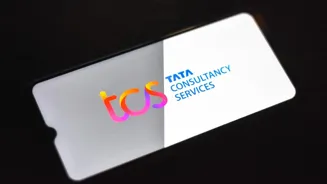While TCS pegged the move to shed 2% of its workforce to skill mismatches rather than AI-related productivity gains, experts viewed the largest-ever layoffs by India's top private employer as the beginning of things to come in the labour-intensive sector. Roughly 12,200 TCS middle and senior management jobs will be lost.
The industry, which has played a crucial role in creating a middle class in India, is increasingly seeing AI being used for everything from basic coding to manual testing and customer support.
The sector employed 5.67 million people as of March 2025 and accounted for over 7% of India's GDP. It has a huge multiplier effect due to the direct and indirect jobs it creates and the cars-to-homes consumption it drives in the world's fifth-largest economy.
It has historically absorbed a majority of India's engineers but that will change as rising AI use ekes out more efficiencies and demands newer skills that many current employees lack, according to half a dozen industry veterans, analysts, and staffing firms.
"We are in the midst of a massive transition that will transform white-collar work as we know it," said Silicon Valley-based Constellation Research founder and chairman Ray Wang, echoing other experts who warned that more layoffs are likely on the cards.
The most vulnerable employees include pure people managers with minimal tech knowledge, those in charge of testing or identifying bugs and ensuring user-friendliness before delivering software to clients, and infrastructure management staff who provide basic tech support and ensure networks and servers are working well, experts said.
"About 400,000 to 500,000 professionals are at risk of being laid off over the next two to three years as their skills don't match client demands," tech market intelligence firm UnearthInsight's founder Gaurav Vasu said, adding that about 70% of those layoffs would impact workers with 4-12 years' experience.
"This (fear stemming from TCS layoffs) may hurt consumer demand for tourism, luxury shopping and even delay long-term investments such as real estate," Vasu said.
TCS and its peers Infosys, HCLTech, Tech Mahindra, Wipro, LTIMindtree, and Cognizant collectively employ over 430,000 workers with 13 to 25 years of experience, according to staffing firm Xpheno.
"At the moment, they may appear like the big fat middle layer," Xpheno's co-founder Kamal Karanth said. None of the IT firms responded to Reuters queries seeking comment.
"With cost optimisation being the key driver for new deal wins, clients are asking for productivity benefits — a trend which is also growing due to the rise in AI adoption. This requires IT firms to do more work with the same number of employees or the same work with fewer employees," Jefferies analyst Akshat Agarwal said in a research note.
ADAPT OR PERISH
TCS, which had more than 613,000 workers before the layoffs, said in its late July announcement it was gearing up to be "future-ready" by investing in new technologies, entering new markets, deploying AI at scale for its clients and itself, and realigning its workforce model. It did not answer Reuters queries on how many layoffs were tied to AI adoption and why it could not redeploy the affected employees.
"This is very devastating news," said a 45-year-old, Kolkata-based TCS employee affected by the latest layoffs. "It is very difficult for people my age to get new jobs."
Some others who are still at TCS fretted over its mediocre performance bonuses for senior employees in recent quarters, a new "bench policy" that limits the time somebody could be without a project regardless of personal circumstances or past performance, on-boarding delays, and the emotional turmoil caused by the layoffs.
"All these developments have tanked the morale of mid-career folks like me," a Pune-based TCS employee said.
The Indian outsourcing sector has been a key employment engine since the 1990s, offering upward mobility to millions of engineers. But revenue growth has weakened recently as its clients, stung by inflation and US tariff uncertainty, defer discretionary spending and demand better cost management.
"The tech industry is at an inflection point, as AI and automation move to the very core of how businesses operate," industry body Nasscom said.
During past tech revolutions, disruption was felt at the organisational level.
"With AI, for the first time, the onus is on the individual to reinvent or re-skill themselves," former Tech Mahindra CEO CP Gurnani said.
















